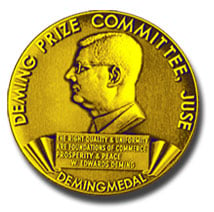By John Hunter, author of the Curious Cat Management Improvement Blog (since 2004).

The 2012 Deming Prize winners were announced today by the Union of Japanese Scientists and Engineers (JUSE).
The companies awarded the Deming Prize this year are:
- SRF Limited, Chemicals Business (India)
- Mahindra & Mahindra Limited, Farm Equipment Sector, Swaraj Division (India)
This continues the recent trend of organizations based in India receiving the Deming prize. Since 2000, organizations based in India have received 19 prizes while organizations based in all other countries combined have received 21 (Thailand 10, Japan 7, USA 1, Singapore 1, China 1 and Taiwan 1).
3 years after a company has received the Deming Prize they may apply to the top prize. That prize has been named the Japan Quality Medal but has been renamed, this year, to the Deming Grand Prize.
This year 3 Deming Grand Prize winners were selected, all are Indian companies:
- Tata Steel Limited (India) – Winning the Deming prize (2008 article)
- Rane (Madras) Limited (India)
- Lucas-TVS Limited (India)
Only 20 companies had been awarded the prize previously. Toyota was awarded the first award in 1970. In 1997 the first award for an organization based outside Japan was awarded to Philips Taiwan.
Related: Mahindra’s Farm Equipment Sector receives the Japan Quality Medal [link was broken so it was removed]
The Deming Prize for Individuals went to: Mr. Makoto Nakao, President & Chief Executive Officer, GC Corporation (Japan). And Mr. Janak Mehta
Chairman & Managing Director, TQM International Pvt. Ltd. was given the Deming Distinguished Service Award for Dissemination and Promotion (Overseas).
Some background on the Deming Prize [link was broken so it was removed] from the JUSE web site:
The Deming Prize examination does not require applicants to conform to a model provided by the Deming Prize Committee. Rather, the applicants are expected to understand their current situation, establish their own themes and objectives and improve and transform themselves organization-wide. Not only the results achieved and the processes used, but also the effectiveness expected in the future are subjects for the examination. To the best of their abilities, the examiners evaluate whether or not the themes established by the applicants were commensurate to their situation; whether or not their activities were suitable to their circumstance and whether or not their activities are likely to achieve their higher objectives in the future.
…
There is no easy success at this time of constant change. No organization can expect to build excellent quality management systems just by solving problems given by others. They need to think on their own, set lofty goals and drive themselves to challenge for achieving those goals. For these organizations that introduce and implement TQM in this manner, the Deming Prize aims to be used as a tool for improving and transforming their business management.
How was the Deming Prize established? [link was broken so it was removed]
The late Dr. W. E. Deming (1900 – 1993), one of the foremost experts of quality control in the United States, was invited to Japan by the Union of Japanese Scientists and Engineers (JUSE) in July 1950.
Upon his visit, Dr. Deming lectured day after day his “Eight-Day Course on Quality Control” at the Auditorium of the Japan Medical Association in Kanda-Surugadai, Tokyo. This was followed by Dr. Deming’s “One-Day Course on Quality Control for Top Management,” held in Hakone. Through these seminars, Dr. Deming taught the basics of statistical quality control plainly and thoroughly to executives, managers, engineers and researchers of Japanese industry. His teachings made a deep impression on the participants’ mind and provided great impetus to quality control in Japan, which was in its infancy.
The transcript of the eight-day course, “Dr. Deming’s Lectures on Statistical Control of Quality,” was compiled from stenographic records and distributed for a charge. Dr. Deming donated his royalties to JUSE. In appreciation of Dr. Deming’s generosity, the late Mr. Kenichi Koyanagi, managing director of JUSE, proposed using it to fund a prize to commemorate Dr. Deming’s contribution and friendship in a lasting way and to promote the continued development of quality control in Japan.


